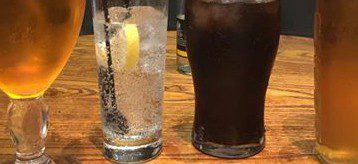Public Health Scotland today published findings from two studies commissioned to investigate the impact of the COVID-19 pandemic – and related restrictions – on alcohol consumption in Scotland during its first few months. Taken together, these two studies suggest that at a population level people were drinking at reduced levels in the early months of the COVID-19 pandemic, when restrictions included the closure of licensed alcohol premises, compared to the same months in previous years.
One study used weekly alcohol sales data to estimate the impact on population level alcohol consumption in Scotland, and in England & Wales. The data include both sales through the off-trade (supermarkets and off-licences) and the on-trade (pubs, clubs and restaurants) during the period January 2017 to July 2020. This allowed the researchers from Public Health Scotland and the University of Glasgow to describe how weekly sales in the first four months of the pandemic differed from expected sales based on recent trends.
It found that the pandemic and related restrictions were associated with a 6% reduction in the total volume of pure alcohol sold per adult in Scotland and in England & Wales. Increases in per adult off-trade sales (28% in Scotland and 29% in England & Wales), did not fully replace the loss of on-trade sales. Despite the overall reduction in alcohol sales in this period, weekly averages – 17.5 units per adult in Scotland, and 16.7 in England & Wales – remained in excess of the UK Chief Medical Officers’ guideline of 14 units per week.
The impact of COVID-19 and related restrictions varied by drink category. The greatest reduction in per adult sales was found for beer, with a 23% reduction in Scotland and 19% reduction in England & Wales, due to almost half of per adult beer sales being through on-trade premises. Total sales of wine increased by 4% in Scotland (compared to 8% in England & Wales) while total sales of spirits remained unchanged in both Scotland and England & Wales. Per adult sales through the off-trade increased for most drink categories.
The second study used self-reported data to assess how drinking behaviour changed, and how particular population sub-groups were affected, during the first three months of the pandemic. Researchers from the University of Sheffield assessed changes in the average number of drinking days people had, occasions they drank on and the number of alcohol units they drank per week.
Whilst not all the findings were found to be statistically significant, all measures of self-reported off-trade consumption in both Scotland and England increased during the initial period of the COVID-19 restrictions. In Scotland off-trade units of alcohol per week increased by 21% (2.4 units), and units per occasion increased by 29% (1.1 units). However, these only compensated for some of the losses in on-trade consumption, and overall self-reported units of alcohol per week reduced by 5% (0.8 units). This is consistent with the findings of the weekly alcohol sales study.
Grant Wyper, Public Health Intelligence Adviser at Public Health Scotland, said:
“We know that the pandemic has wider impacts on individuals’ health other than those that occur as the direct result of infection. This includes the indirect effects of interventions to control COVID-19 that have affected opportunities to buy alcohol, whilst also impacting on many people’s personal, social, and economic circumstances.
“Overall, there was a 6% reduction in total alcohol sales in Scotland, as increases in off-trade sales did not fully replace the reduction in on-trade sales associated with the closure of pubs, clubs and restaurants during the initial lockdown period between March and July 2020.
“At the same time some self-reported alcohol consumption measures also reduced, although there has been a notable shift to later start times of drinking, and increased solitary drinking, amongst some population sub-groups such as single adult households, households with three or more adults and those in full time education”.
Public Health Scotland will continue to monitor and evaluate Scotland’s alcohol strategy, as well as the on-going impact of the COVID-19 pandemic and the measures taken to control the spread of the virus, on alcohol sales and consumption.
Visit our Monitoring and Evaluating Scotland’s Alcohol Strategy (MESAS) page to read the full reports.






